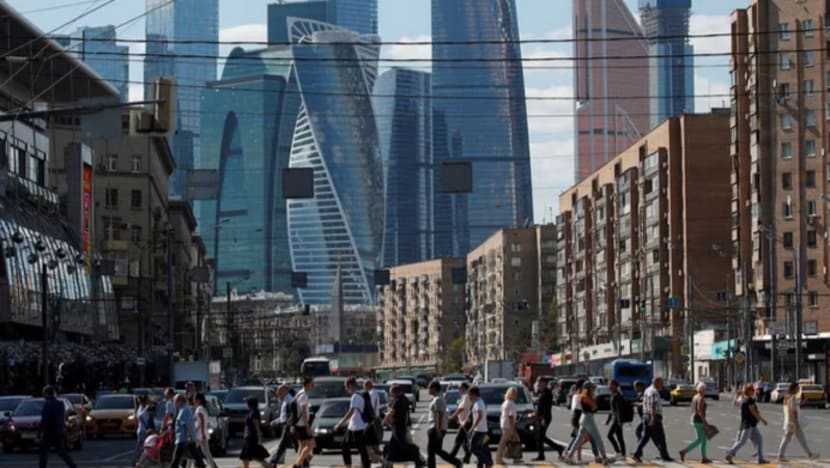Russia’s economy risks overheating despite rebound, say analysts
Russia's economy shrugged off Western sanctions to rebound sharply in 2023, boosted by high military spending.

Pedestrians cross a road against a backdrop of skyscrapers at the Moscow International Business Center, also known as "Moskva-City", in Moscow, Russia August 10, 2018. (Photo: REUTERS/Maxim Shemetov)

This audio is generated by an AI tool.
Since Russia’s invasion of Ukraine in February 2022, the United States, European Union, and other countries have hit Russia with wave after wave of unprecedented sanctions.
But two years on, figures suggest that some sectors of Russia’s economy are adapting and recovering, and Moscow is finding new ways to cope and develop.
Annual data earlier this month showed Russia's economy rebounded sharply from a slump in 2022, jumping 3.6 per cent last year.
However, economists said the growth was boosted by staggeringly high military spending, with war efforts sucking public resources into arms and ammunition production at an unsustainable pace. This puts the economy at risk of major overheating, they said.
International politics Professor Scott Lucas from the University College Dublin’s Clinton Institute said that reports of Russia’s economic resilience are “misleading narratives” that Moscow is continuing to function well as a wartime economy.
“Increasing inflation, cost pressures… are going to be difficult for the economy to absorb in the long term. But (Russia) just keeps trying to produce more and more,” he told CNA's Asia Tonight.
While the International Monetary Fund (IMF) has forecast continued strong growth this year, it also warned that Russia's war economy faces tough times ahead due to the outflow of people and shortage of technology.
The financial organisation’s managing director Kristalina Georgieva said that with consumption remaining low, growth buoyed by defence spending offers little benefit to ordinary Russians.
RUSSIA’S 2023 REBOUND
Despite the sanctions, there are still customers for Russia’s oil and other commodities.
Some countries are not participating in the sanctions while Russia has also circumvented restrictions by turning to third-party intermediaries.
Export flows from its key oil sector have been redirected to China and India, which together account for around 90 per cent of its crude exports, Russian Deputy Prime Minister Alexander Novak said.
Major American and European brands that pulled out of Russia in droves over the war have been replaced by local companies or firms from so-called friendly states in Asia and the Middle East.
In addition, Russia has invested heavily in machine building, aviation, infrastructure and large industrial enterprises, in a bid to replace unavailable Western technology.
The higher defence expenditure fed into the wider economy, boosting the development of regions where people involved in military-related industries are earning and spending more.
By the end of last year, the Russian economy outpaced the US and Europe in terms of growth.
Russia’s President Vladimir Putin has gloated that his country’s economic performance has defeated Western sanctions and bounced back stronger.
Professor Maxim Bratersky from the Higher School of Economics in Moscow, said: “Due to different social programmes, the salaries of participants of the military operation (in Ukraine), the disposable income of Russians increased by more than 5 per cent. This increase has been presented to the market as demand, which helps the Russian economy.”
DO SANCTIONS STILL WORK?
Last week, the US imposed a fresh slate of sanctions on more than 500 people and entities linked to the war, as well as the death of opposition leader Alexei Navalny.
There have been concerns that the host of financial tools used by Washington and its allies to isolate Russia is not working.
But observers said sanctions take time and their effects will intensify in the longer run, hitting Russia’s key markets and significantly degrading its industrial and technological capacity. They added that sanctions have hampered Moscow's war capabilities in Ukraine.
“This is a marathon not a sprint. (We can’t expect sanctions to defeat) Russia in the next two or three months on the economic front,” said Prof Lucas.
“(Sanctions) have affected Russia's aircraft industry, and thus the ability to replace lost war planes. They have affected Russia's manufacturing industry and thus the ability to put even more armour or equipment onto the front lines.
“They have disrupted the Russian war machine, even if the Russians maintain a serious advantage (on the battlefield).”















